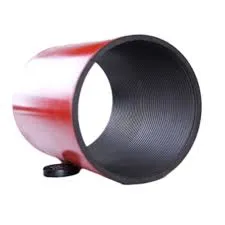teflon coupling
Understanding Teflon Couplings A Comprehensive Overview
Teflon couplings, known for their versatile applications in various industries, represent a crucial component in the field of engineering and manufacturing. Made from polytetrafluoroethylene (PTFE), commonly known as Teflon, these couplings are utilized for their unique properties, including chemical resistance, thermal stability, and low friction characteristics.
The Properties of Teflon
Teflon, invented in the 1930s, is a fluoropolymer known for its non-stick characteristics. This substance operates effectively in extreme conditions, making it an excellent choice for couplings that may be exposed to corrosive chemicals or high temperatures. The ability of Teflon to resist reactivity with a wide range of substances is one of its most noteworthy features, ensuring that Teflon couplings do not compromise the integrity of the fluids or gases they transport.
Applications of Teflon Couplings
Teflon couplings are frequently employed in industries such as chemical processing, pharmaceuticals, food and beverage, and even aerospace. In chemical processing, for example, Teflon couplings ensure that various chemicals can be transported without risk of contamination or degradation of materials. Their non-reactive nature means they can handle acids, bases, and solvents without breaking down or leaching harmful substances.
In the pharmaceutical industry, sterility and purity are paramount. Teflon couplings are precisely engineered to meet stringent hygiene standards, allowing the safe transfer of drugs and additives. Similarly, in the food and beverage sector, Teflon’s non-stick surface prevents food particles from adhering to the coupling, facilitating clean processes and compliant production lines.
Advantages of Using Teflon Couplings
1. Chemical Resistance The foremost advantage of Teflon couplings is their exceptional resistance to various chemicals. Unlike traditional metal or rubber couplings, Teflon does not corrode or degrade when exposed to aggressive substances, enhancing system longevity and safety.
teflon coupling

2. Temperature Tolerance Teflon couplings can withstand a wide temperature range, from very low temperatures to as high as 260°C (500°F). This wide operating range makes them suitable for diverse applications, including steam services or cryogenic environments.
3. Low Friction The low coefficient of friction inherent in Teflon reduces wear and tear on coupled components. This not only extends the life of the coupling but also minimizes energy losses in dynamic applications, contributing to overall system efficiency.
4. Easy to Install Teflon couplings are lightweight and often designed for easy integration into existing systems. Their flexibility and adaptability make them ideal for both new installations and retrofitting existing piping or equipment.
Challenges and Considerations
Despite their many advantages, there are considerations when using Teflon couplings. They may not be suitable for all mechanical applications due to their relatively low tensile strength compared to metals. Proper engineering assessments are crucial to ensure that Teflon couplings are used in appropriate applications where mechanical stress and movement are minimal.
Additionally, care must be taken regarding the proper installation and compatibility with other materials, especially in critical applications where failures could lead to safety hazards.
Conclusion
In summary, Teflon couplings are an invaluable resource in modern engineering. Their unique properties cater to specific needs across various industries, providing solutions that enhance safety, efficiency, and reliability. As technology advances, the versatility and application of Teflon couplings are expected to expand, paving the way for innovations that could further solidify their place in industrial and commercial applications. Understanding their capabilities and limitations is essential for engineers and manufacturers looking to optimize their processes while ensuring the highest standards of quality and safety.
-
Choosing the Right Pup Joint Manufacturers for Oil and Gas OperationsNewsAug.22,2025
-
Tubing Coupling: The Small Connector with a Big ImpactNewsAug.22,2025
-
Tubing Crossover: The Essential Connector for Well IntegrityNewsAug.22,2025
-
Precision Flow Control in Well CompletionsNewsAug.22,2025
-
Casing Pup Joint for Optimal Well PerformanceNewsAug.22,2025
-
Reliable Connections with Wholesale Finished Casing CouplingNewsAug.22,2025







